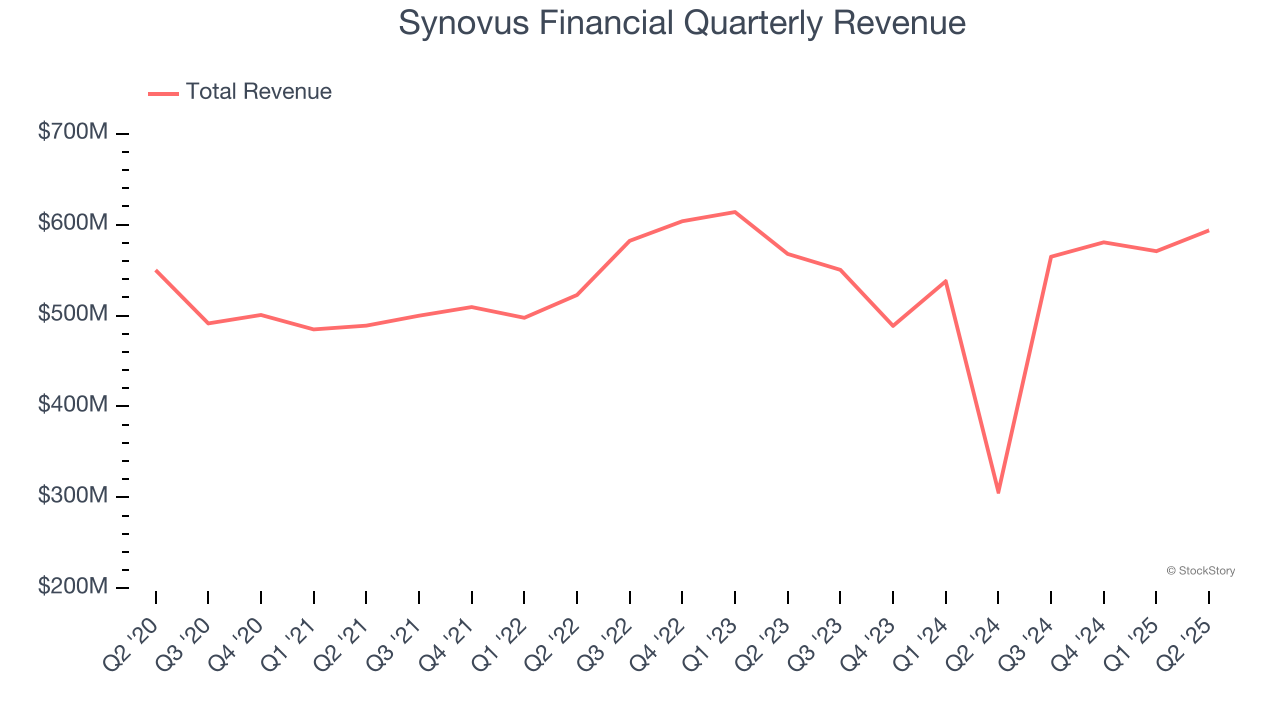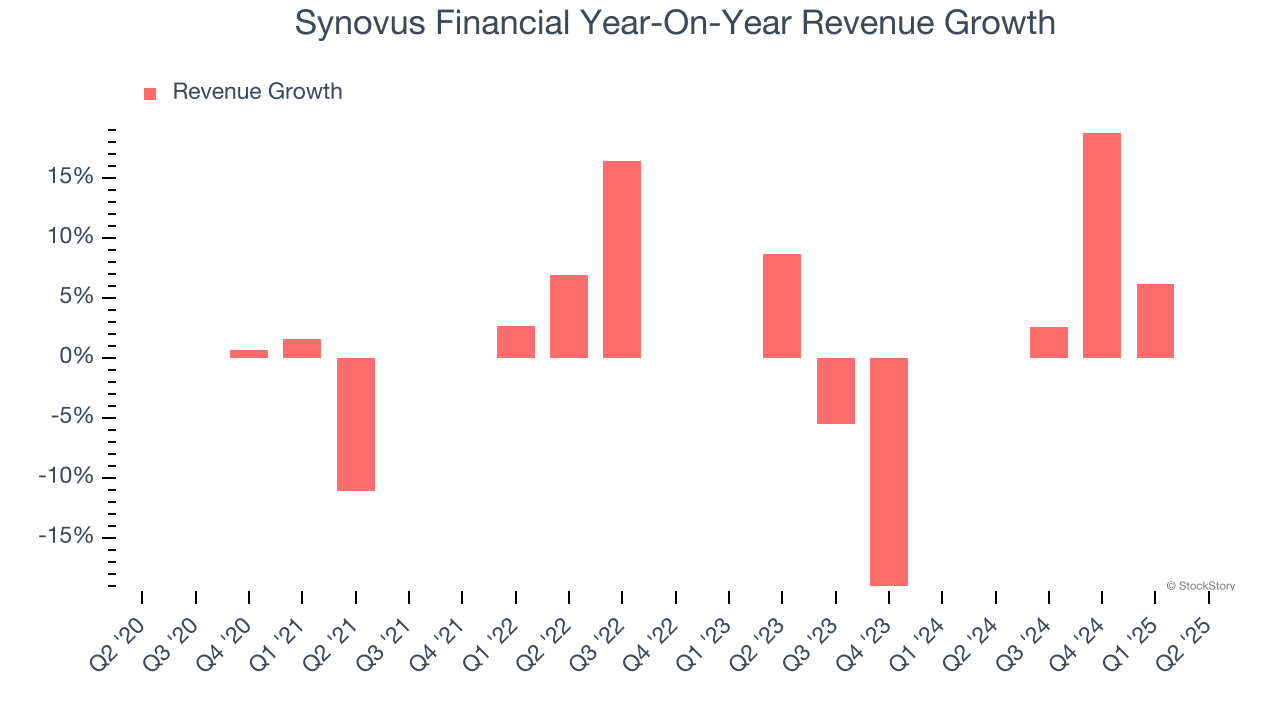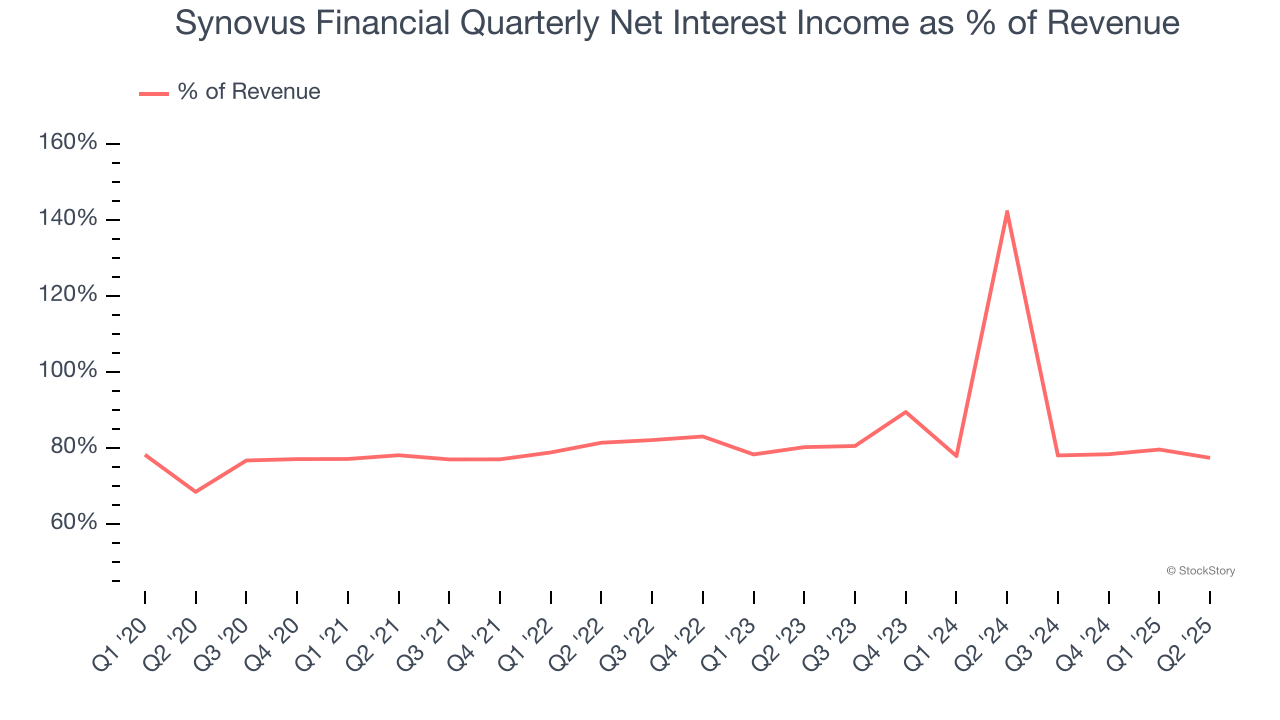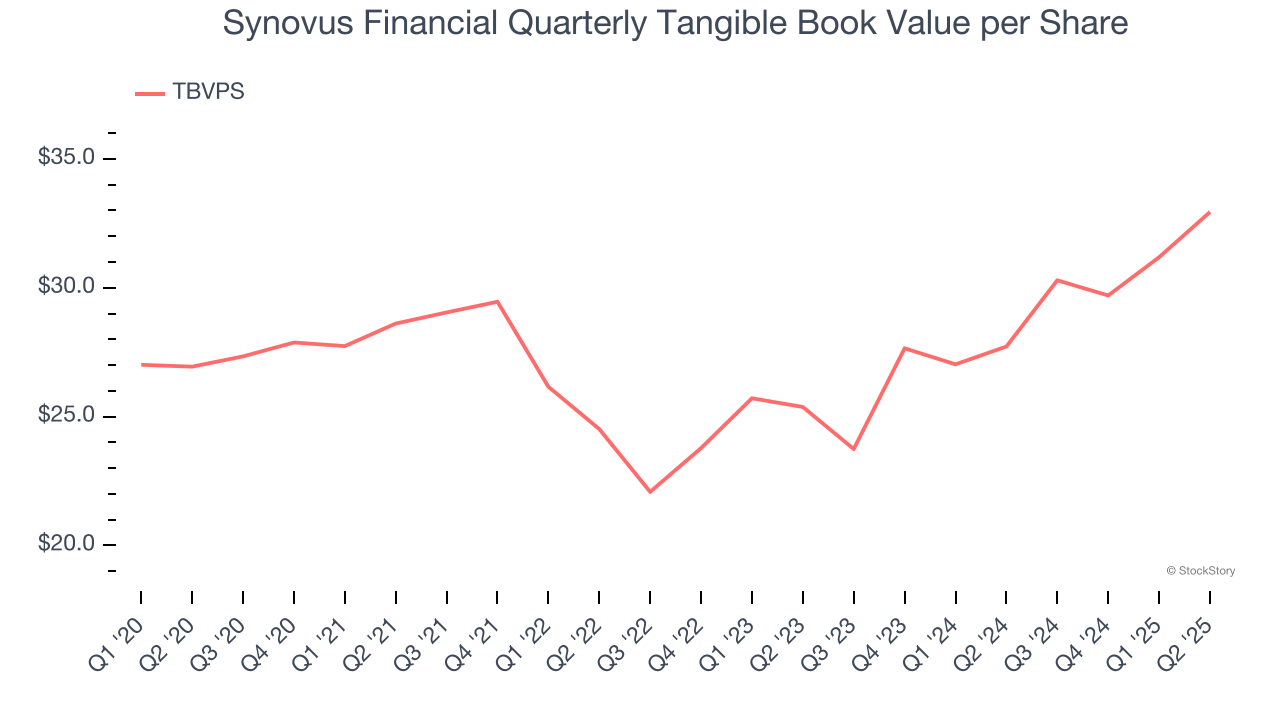
Regional banking company Synovus Financial (NYSE:SNV) reported Q2 CY2025 results topping the market’s revenue expectations, with sales up 93.9% year on year to $593.7 million. Its non-GAAP profit of $1.48 per share was 17.9% above analysts’ consensus estimates.
Is now the time to buy Synovus Financial? Find out by accessing our full research report, it’s free.
Synovus Financial (SNV) Q2 CY2025 Highlights:
- Net Interest Income: $459.6 million vs analyst estimates of $464.3 million (5.6% year-on-year growth, 1% miss)
- Net Interest Margin: 3.4% vs analyst estimates of 3.4% (17 basis point year-on-year increase, in line)
- Revenue: $593.7 million vs analyst estimates of $585.1 million (93.9% year-on-year growth, 1.5% beat)
- Efficiency Ratio: 53% vs analyst estimates of 53.6% (0.5 percentage point beat)
- Adjusted EPS: $1.48 vs analyst estimates of $1.26 (17.9% beat)
- Market Capitalization: $7.30 billion
“Synovus delivered impressive 28% year-over-year growth in adjusted earnings per share in the second quarter -- an achievement driven by exceptional financial discipline, strategic execution and a steadfast commitment to operational excellence. Funded loan production surged 60% year over year, driving 8% annualized loan growth. Moreover, this quarter's positive operating leverage further strengthened our top-quartile efficiency ratio and profitability. Credit quality improved across all categories, and our Common Equity Tier 1 capital ratio reached the highest level in our company's history. Despite the continuing economic and global uncertainty, our performance reflects the strength of our strategy, resilience of our team and the trust of our clients. With this strong performance and conviction in our strategy, we've confidently raised our full-year 2025 earnings guidance," said Synovus Chairman, CEO and President Kevin Blair.
Company Overview
Tracing its roots back to 1888 when a worker accidentally dropped a textile mill payroll into the dust, prompting the need for better banking, Synovus Financial (NYSE:SNV) is a regional financial services company that provides commercial and consumer banking, wealth management, and specialized lending services across five southeastern states.
Sales Growth
Net interest income and and fee-based revenue are the two pillars supporting bank earnings. The former captures profit from the gap between lending rates and deposit costs, while the latter encompasses charges for banking services, credit products, wealth management, and trading activities.
Unfortunately, Synovus Financial’s 2.8% annualized revenue growth over the last five years was tepid. This fell short of our benchmarks and is a tough starting point for our analysis.

Long-term growth is the most important, but within financials, a half-decade historical view may miss recent interest rate changes and market returns. Synovus Financial’s performance shows it grew in the past but relinquished its gains over the last two years, as its revenue fell by 1.2% annually.  Note: Quarters not shown were determined to be outliers, impacted by outsized investment gains/losses that are not indicative of the recurring fundamentals of the business.
Note: Quarters not shown were determined to be outliers, impacted by outsized investment gains/losses that are not indicative of the recurring fundamentals of the business.
This quarter, Synovus Financial reported magnificent year-on-year revenue growth of 93.9%, and its $593.7 million of revenue beat Wall Street’s estimates by 1.5%.
Net interest income made up 82.5% of the company’s total revenue during the last five years, meaning Synovus Financial barely relies on non-interest income to drive its overall growth.

While banks generate revenue from multiple sources, investors view net interest income as the cornerstone - its predictable, recurring characteristics stand in sharp contrast to the volatility of non-interest income.
Unless you’ve been living under a rock, it should be obvious by now that generative AI is going to have a huge impact on how large corporations do business. While Nvidia and AMD are trading close to all-time highs, we prefer a lesser-known (but still profitable) stock benefiting from the rise of AI. Click here to access our free report one of our favorites growth stories.
Tangible Book Value Per Share (TBVPS)
The balance sheet drives banking profitability since earnings flow from the spread between borrowing and lending rates. As such, valuations for these companies concentrate on capital strength and sustainable equity accumulation potential.
This explains why tangible book value per share (TBVPS) stands as the premier banking metric. TBVPS strips away questionable intangible assets, revealing concrete per-share net worth that investors can trust. Traditional metrics like EPS are helpful but face distortion from M&A activity and loan loss accounting rules.
Synovus Financial’s TBVPS grew at a mediocre 4.1% annual clip over the last five years. However, TBVPS growth has accelerated recently, growing by 13.9% annually over the last two years from $25.37 to $32.94 per share.

Over the next 12 months, Consensus estimates call for Synovus Financial’s TBVPS to grow by 8.6% to $35.79, decent growth rate.
Key Takeaways from Synovus Financial’s Q2 Results
We enjoyed seeing Synovus Financial beat analysts’ revenue, efficiency ratio, and EPS expectations this quarter. We were also glad its tangible book value per share outperformed Wall Street’s estimates. On the other hand, its net interest income slightly missed. Still, we think this was a solid quarter with some key areas of upside. The stock traded up 1.9% to $53.90 immediately after reporting.
Synovus Financial may have had a good quarter, but does that mean you should invest right now? When making that decision, it’s important to consider its valuation, business qualities, as well as what has happened in the latest quarter. We cover that in our actionable full research report which you can read here, it’s free.
